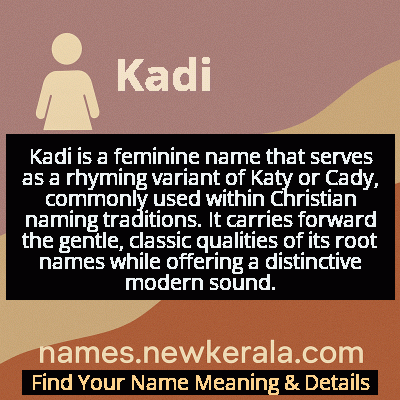Kadi Name Meaning & Details
Origin, Popularity, Numerology Analysis & Name Meaning of Kadi
Discover the origin, meaning, and cultural significance of the name KADI. Delve into its historical roots and explore the lasting impact it has had on communities and traditions.
Name
Kadi
Gender
Female
Origin
Christian
Lucky Number
7
Meaning of the Name - Kadi
Kadi is a feminine name that serves as a rhyming variant of Katy or Cady, commonly used within Christian naming traditions. It carries forward the gentle, classic qualities of its root names while offering a distinctive modern sound.
Kadi - Complete Numerology Analysis
Your Numerology Number
Based on Pythagorean Numerology System
Ruling Planet
Neptune (Ketu)
Positive Nature
Intuitive, analytical, spiritual, and inquisitive.
Negative Traits
Secretive, reserved, aloof, and can be overly critical.
Lucky Colours
Green, yellow.
Lucky Days
Monday.
Lucky Stones
Cat’s eye, moonstone.
Harmony Numbers
1, 5, 6.
Best Suited Professions
Scientists, researchers, spiritual leaders, detectives.
What People Like About You
Depth of knowledge, analytical skills, spirituality.
Famous People Named Kadi
Kadi Põldmaa
Estonian actress
Prominent stage and film actress in Estonian theater
Kadi Liis Saar
Estonian singer
Lead vocalist of the band Liis Lemsalu and successful solo artist
Kadi Kolk
Estonian actress and director
Notable theater director and actress at the Estonian Drama Theatre
Kadi Vassil
Estonian fashion model
International fashion model who has worked with major fashion houses
Name Variations & International Equivalents
Click on blue names to explore their detailed meanings. Gray names with will be available soon.
Cultural & Historical Significance
Extended Personality Analysis
Women named Kadi are typically characterized by a blend of creativity and practicality that serves them well in both personal and professional spheres. They often exhibit strong independent streaks from an early age, preferring to forge their own paths rather than follow conventional routes. This independence is balanced by deep emotional intelligence, allowing them to form meaningful connections while maintaining their autonomy. Their creative nature manifests in various forms, from artistic pursuits to innovative problem-solving approaches in their careers. Kadi's tend to be excellent communicators who express themselves clearly and persuasively, often taking on leadership roles naturally. They value authenticity in relationships and are known for their loyalty to friends and family. While they embrace modern ideas and progressive values, they typically maintain respect for tradition and stability, creating a well-rounded personality that adapts to changing circumstances without losing core principles. This combination makes them particularly effective in careers requiring both innovation and emotional connection, such as education, arts, counseling, or entrepreneurship.
Modern Usage & Popularity
In contemporary naming practices, Kadi maintains a stable presence with particular strength in Estonian-speaking regions where it consistently ranks within popular name lists. The name's international appeal has grown gradually as global connectivity increases, with parents appreciating its easy pronunciation across languages and cultures. Modern usage trends show Kadi being chosen by parents who value names that are both distinctive and accessible, avoiding both extreme uniqueness and overwhelming popularity. While not experiencing viral popularity spikes, the name demonstrates remarkable staying power, suggesting it appeals to a consistent segment of name-givers who prioritize melodic quality, cultural heritage, and gender clarity. Its Christian associations continue to influence selection in religious families, though many secular parents choose it purely for its aesthetic and practical qualities. The name's modern usage reflects a broader trend toward shorter, vowel-rich feminine names that work well in digital and global contexts while maintaining cultural specificity.
Symbolic & Spiritual Meanings
Symbolically, Kadi represents the harmonious balance between tradition and innovation, carrying meanings of purity, clarity, and creative expression. The name's crisp phonetic structure symbolizes straightforwardness and honesty, while its melodic quality suggests emotional depth and artistic sensibility. Metaphorically, Kadi embodies the concept of cultural bridging—honoring heritage while embracing global connectivity. The name suggests someone who maintains core values while adapting to changing circumstances, representing resilience and authenticity in modern life. Its relative rarity in many cultures adds symbolism of individuality and distinct personal identity, while its established history provides a foundation of stability and continuity. The name also carries subtle connotations of northern European landscapes—clean, clear, and naturally beautiful—reflecting the cultural environments where it flourished most prominently.

